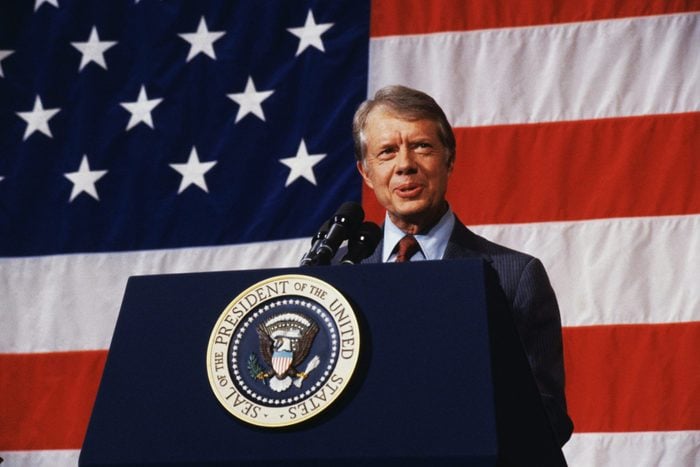
Jimmy Carter’s accomplishments
It’s a well-known fact about the U.S. presidency that it’s never an easy job. Every U.S. president has had the opportunity to lead the country through challenges and changes, and Jimmy Carter’s presidency was no exception. The 39th president of the United States, Jimmy Carter (James Earl Carter Jr.) held office for just a single term, from 1977 to 1981. During that time he dealt with an energy crisis, high inflation, a war in Afghanistan and the Iran hostage crisis. While the question “Was Jimmy Carter a good president?” may be up for debate, these Jimmy Carter quotes prove he’s a man with a strong human rights ethic and a desire to represent the people that began in his youth. Recently, at the age of 99 and in failing health, the former president opted to receive hospice care at home with his family in Georgia. Focused on compassion, pain relief and emotional support, hospice care is designed to make patients and their families comfortable in their final days; it’s an interesting Jimmy Carter fact that the movement got its start in the late 1970s, under his presidency. (Find out what happens when a president dies.)
While his most enduring legacy is the Carter Work Projects for Habitat for Humanity, the former president spent his life in service, making a significant difference to the world both during and after his presidency. From winning the Nobel Peace Prize to his important environmental and anti-discrimination work, here are the surprising things you didn’t know about Jimmy Carter.
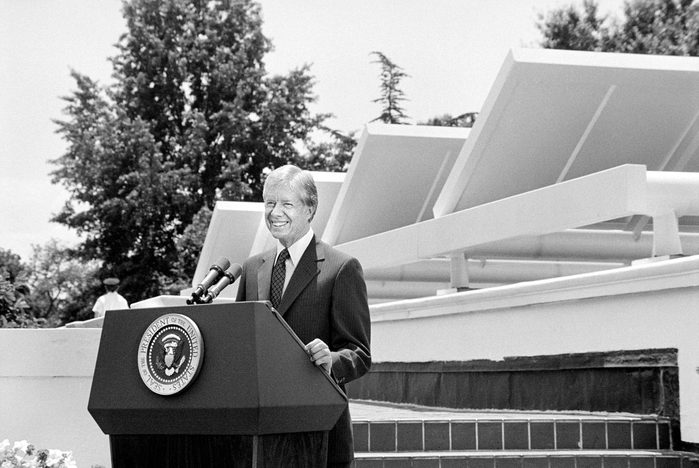
He installed solar panels at the White House
In the 1970s, America was undergoing an energy crisis. The country’s support of Israel in the Yom Kippur war against a coalition of Arab states led to an oil embargo. Being almost entirely dependent on oil produced in those Arab countries, the U.S. saw gas prices soar as supply ran low. In response, Carter created the Department of Energy to research renewable energy that could be produced at home, especially wind and solar. On June 20, 1979, 32 solar panels were installed on the roof of the White House to heat its hot water. They remained there until 1986, when they were removed under Ronald Reagan’s presidency. President Obama re-installed solar panels on the roof in 2013, which remain there to this day.
Jimmy Carter’s presidency was one of the first times the public’s attention was drawn to the idea and promise of green energy; he even had an ambitious goal for the U.S. to run on 20% renewable energy by the year 2000. With solar panels now popping up on roofs from Arizona to Maine, we can safely say that what some saw at the time as one of the quirks of U.S. presidents was definitely the action of a green pioneer.
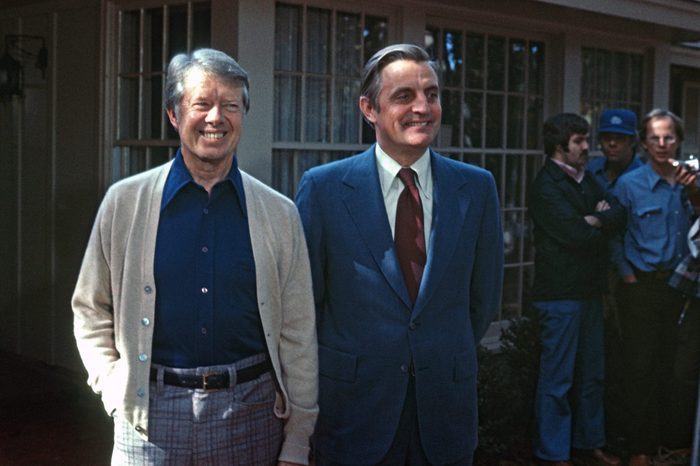
His nickname was “Jimmy Cardigan”
In a surprising presidential first, Jimmy Carter was the first president to use his nickname when sworn into office—Jimmy rather than James—but the Jimmy Carter presidency was marked by another nickname: Jimmy Cardigan, which he earned a mere two weeks into his presidency. After turning down the heat in the West Wing to save energy amid the crisis, President Carter donned a cozy beige cardigan for dinner one evening, then later wore it for a televised fireside chat and accidentally created a new moniker for himself. The casual look was a clue into Jimmy Carter’s dislike of presidential pageantry. In 1977 he put the presidential yacht, the USS Sequoia, up for auction to save costs, and he was well-known for his folksy, straightforward style of speech. He felt he was a man of the people and always wanted to be known as such—it’s one of the reasons we still know him today as a peanut farmer.
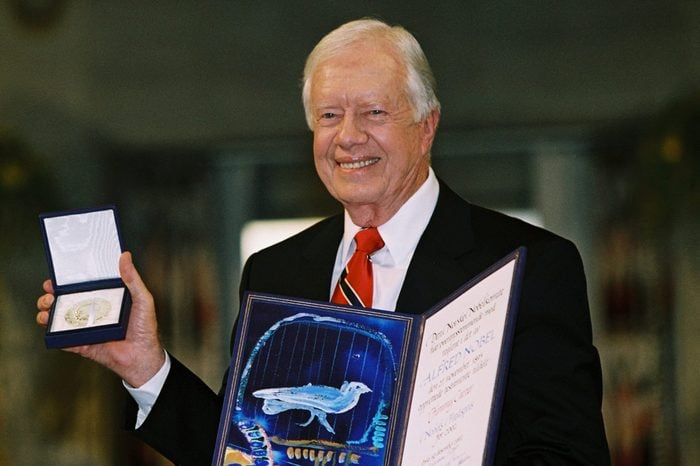
He’s one of four presidents to win the Nobel Peace Prize
After losing the presidential election to Ronald Reagan in 1980, President Carter and his wife Rosalynn set up The Carter Center. The Center was founded to allow the couple to continue the work they had started during Carter’s presidential term: fighting for human rights and advancing democracy all over the world. The Center observes elections to ensure fairness, helps negotiate peace agreements between nations and works to improve health outcomes in developing countries, as well as (famously) building houses for people who need them in conjunction with Habitat for Humanity. In 2002, Jimmy Carter was awarded the Nobel Peace Prize for his actions, making him one of four presidents to receive that honor (alongside Theodore Roosevelt, Woodrow Wilson and Barack Obama). Here’s a piece of presidential trivia you could learn at the Jimmy Carter Library in Atlanta: He was the only one to receive the Prize after he left the presidency.
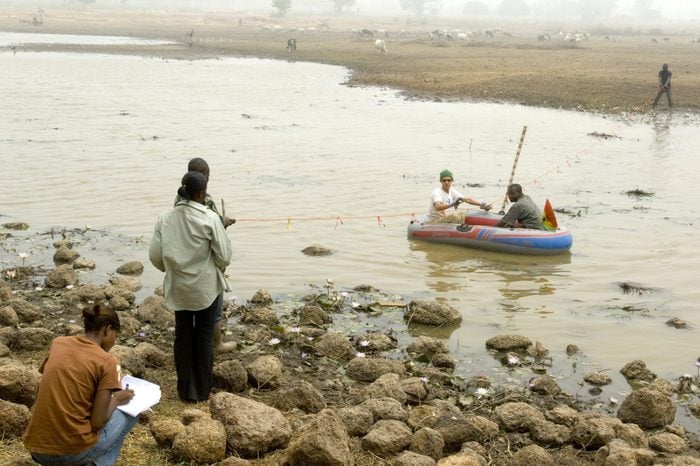
He helped to end a major public health crisis
Today, few have heard of Guinea worm disease, a parasitic infection caused by consuming stagnant water that mostly affects low-income people in tropical regions, and that’s in large part thanks to the Carter Center. Back in 1985, there were a reported 3.5 million cases worldwide when the Carter Center took on the challenge of fixing the issues behind its root cause; today, after nearly 40 years of education and improvement in water sources, 17 countries have declared the disease eradicated, and the total caseload dropped to just 13 in 2022, an amazing achievement. The Center hopes for Guinea worm disease to become the second human disease in history (after smallpox) to be fully eradicated.
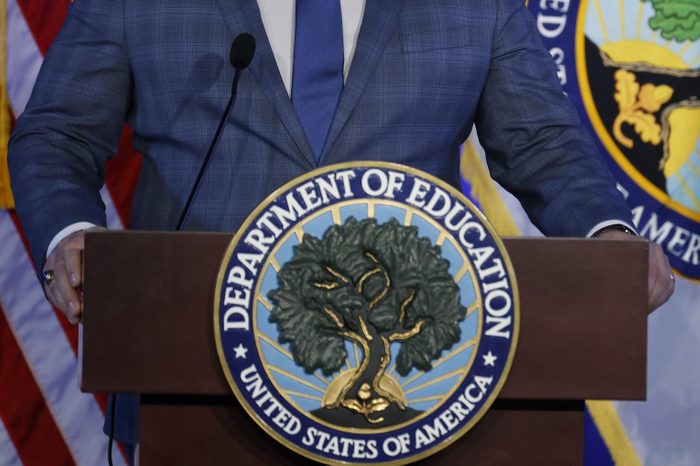
He created the Department of Education
It seems like something as important as education should have had a government department from the very founding of the country, but the Jimmy Carter presidency was actually the first to create a cabinet-level Department of Education, in 1980. President Carter wanted to accomplish two things: first, to fulfill a promise he made to teachers’ unions on the campaign trail by setting up the department, and second, to ensure that every child and adult in America had access to a quality education. With this in mind, President Carter expanded the Head Start program for early childhood education and doubled the government’s spending on education. Given his commitment to education, it’s no surprise that Carter is one of the presidents with the highest IQs.
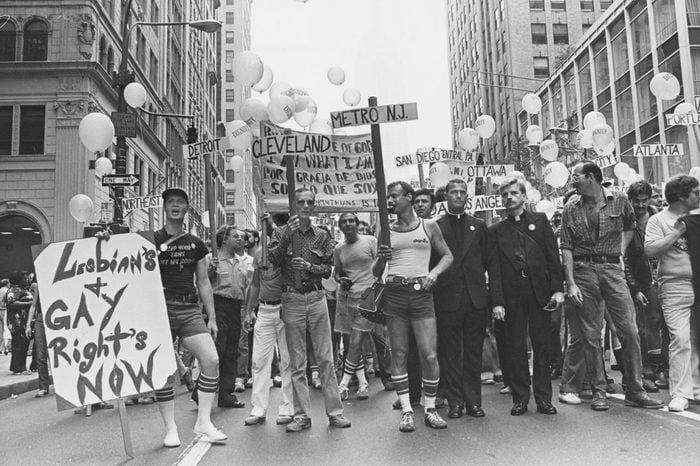
He diversified the government and supported gay rights
Elected governor of Georgia in 1970, Jimmy Carter stated in his inaugural address that “the time for racial discrimination is over.” His gubernatorial administration allowed women and Black people to hold offices in Georgia’s government (a progressive move at the time), and he carried this view into his presidency, appointing record numbers of women and Black and Hispanic people to government positions.
In 1978, Harvey Milk (then mayor of San Francisco and the first openly gay man to be elected to public office in California) wrote to President Carter asking him to speak out publicly against Proposition 6, the Briggs Initiative, which aimed to ban gay men and lesbians from being employed by California’s school districts. President Carter did oppose the Briggs Initiative and became the first president to speak on gay rights.
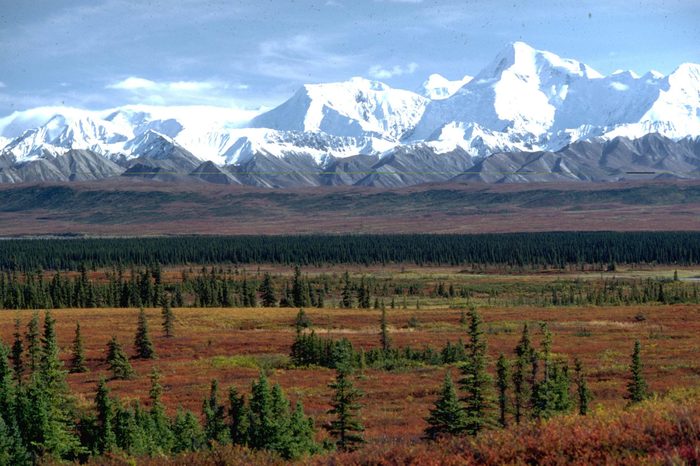
He protected Alaskan lands and cleaned up the environment
In keeping with his environmental interests, the Jimmy Carter presidency pushed through several important pieces of legislation to protect the environment. In 1977 he signed a bill to regulate strip-mining activity, and in 1980 he established Superfund, a federal program to clean up sites of toxic waste and pollution. Superfund has cleaned up more than 750 sites to date. One of President Carter’s final acts as president was to protect more than 100 million acres of Alaskan wilderness as conservation land, expanding the amount of American public land designated as national parks and wildlife refuges.
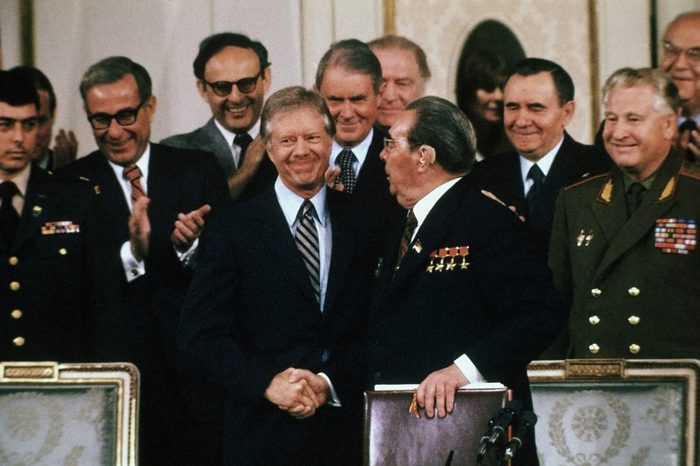
He negotiated the SALT treaty with the Soviet Union
President Carter was elected right in the middle of the Cold War, the post–World War II rivalry between the Soviet Union and the United States. Many people feared an escalation of hostilities between the two superpowers, especially when it came to nuclear weapons. In 1979, President Carter and leader of the USSR Leonid Brezhnev signed a new treaty limiting both the Soviet Union’s and the United States’s stockpile of weapons, to ensure neither had the upper hand. The treaty was known as SALT II: the Strategic Arms Limitation Treaty. It was seen as another step toward preventing all-out conflict, but it was never ratified by the Senate.
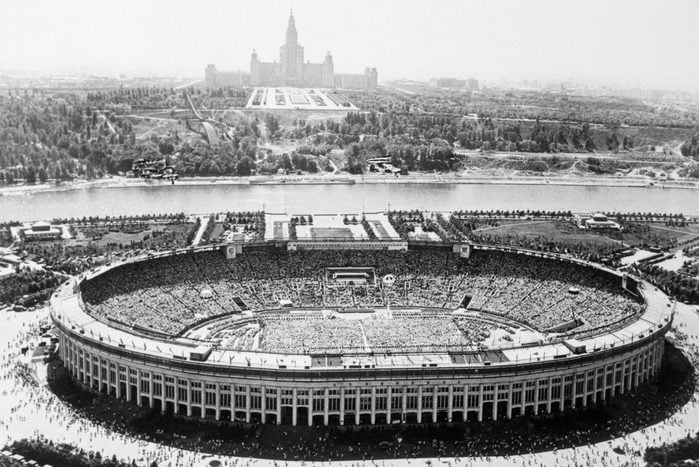
Then boycotted the 1980 Moscow Olympics
In December 1979 the Soviet Union invaded Afghanistan, and in January 1980 President Carter removed the SALT II treaty from the Senate’s consideration in protest. The Jimmy Carter presidency also placed an embargo on American grain being shipped to the Soviet Union and pushed for the Olympic Committee to boycott the 1980 Summer Olympics, to be held in Moscow. Although the decision to boycott the Games did not rest with the president alone, widespread public support led to the Committee agreeing that no American athletes would attend the Games. In total, 65 countries boycotted the summer games.
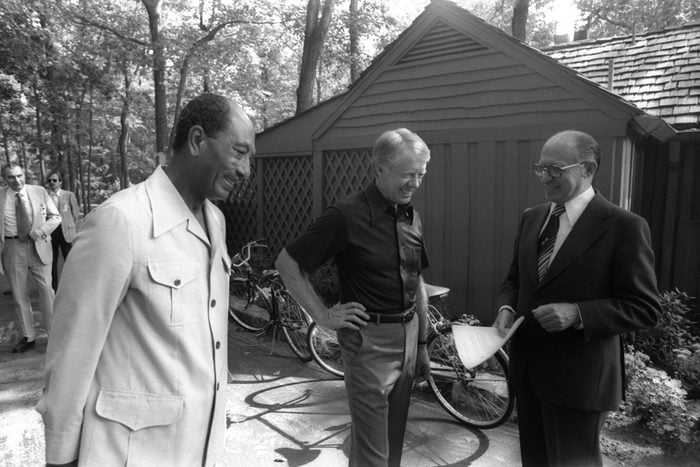
He facilitated the Camp David accords
The Jimmy Carter presidency was marked by a focus on human rights and international relations. One of President Carter’s greatest accomplishments was facilitating peace talks between Israel and Egypt, countries that had been at war on and off since the 1940s. In 1978 the President invited leaders from the rival countries to Camp David, a longtime vacation spot for U.S. presidents in suburban Maryland. The negotiations lasted for 13 days, but the resulting peace agreement was the first in history between Israel and Egypt. It was called the Camp David Accords in recognition of Carter’s work.
Sources:
- Yale Climate Connections: “The forgotten story of Jimmy Carter’s White House solar panels”
- Time: “Top 10 Political Fashion Statements”
- The Carter Center: “Guinea Worm Eradication Program”
- U.S. Department of State: “The Olympic Boycott, 1980”
